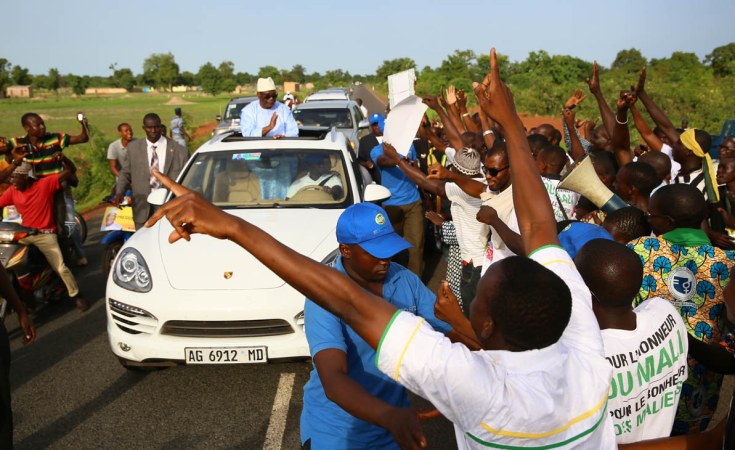Washington, DC — Mali on Thursday, September 19, inaugurates Ibrahim Boubacar Keita as president in a return to democratically-elected government. The country's rebound demonstrates what can happen when the international community unites in a common cause - in this case a French intervention, strongly supported by the United States, the Economic Community of West African States (Ecowas) and the African Union.
It is hard to overstate the remarkable achievements of Mali since the French intervened in January 2013. Imagine a country with two- thirds of its territory under siege by Al Qaeda in the Magreb (AQIM) and other Islamists, an economy in shambles, an interim government dominated by a coup-leader, a devastated infrastructure and a population in constant fear of jihadist attacks.
Malians rose to the occasion on many fronts, particularly in setting the stage for elections. Within a few months, Malians established an electoral law, educated 20,000 poll workers and delivered identity cards (necessary for voter registration) to 80 percent of registered voters.
Malians rewarded the effort. The outcome was two free and fair elections within two weeks. Turnouts in both elections were the highest in Mali's history.
Now comes the hard work of re-establishing and consolidating a democratic nation. IBK, as the president-elect is widely known, faces many challenges, but none is more important than restructuring the military. Mali cannot achieve and maintain a functioning democracy without a professional military that understands and commits to civilian control, respect for human rights and protection of vulnerable populations, including women and children.
In addition to insufficient training and obsolete weapons and equipment, morale is low. Soldiers have no commitment to doctrine and opportunities for corruption abound. Personnel and payroll records are unreliable because of phantom soldiers. A bloated officer corps has grown over the years because of patronage promotions.
The European Union (EU) and France recognize this acute need. A battle-scarred nation still vulnerable to jihadists and disgruntled citizens cannot return to democracy if it cannot defend its borders.
Therefore, training through the EU Training Mission to Mali (EUTM) began before the elections with 200 European trainers from 22 countries. In addition, the British are sending a regiment for six months to train the Malian military. The British contingent includes civilians to train in human rights and humanitarian law, thereby providing an opportunity to reinforce the concept of civilian control of the military.
Given this international support and his own standing, IBK has a rare opportunity to fundamentally change Mali's military paradigm. President Keita has good relations with the military, which backed him publicly.
That military relationship is the reason several persons reported that they voted for him. He has a mandate to deal with the military. The appointment of Defense Minister Souleylou Boubeye Maiga brings another senior politician (former foreign minister) to address the military challenge. Working as a team, President Keita can reinforce the decisions of his minister.
While the military is critical to Mali's internal security, it is also instrumental in Mali's collaboration with neighboring countries, particularly Algeria. Stopping the movement of terrorists along Mali's many borders, in addition to curtailing the flow of arms, is imperative.
The intervention of the international community worked in January in Mali, but such urgent interventions are not a good model. In the future, providing more financial support, military assistance and training and control to the African Union and regional entities such as Ecowas would enable those regional institutions to achieve the necessary capacity and quick response time needed for responding to crises.
For President Keita, the next big ceremony is his inauguration. As he stands before the nation on Thursday, he can be proud that Mali, with the help in the international community, West African neighbors and Malians who would not be cowed by jihadists, has rallied and saved the greater Sahel from becoming another arc of crisis. That pride can help the president face the multiple challenges of re-knitting a frayed nation: e.g. maintaining territorial integrity, integrating the Tuareg and other minorities, kick-starting the economy, tackling corruption.
To help him with those tasks, Keita will have solid partners standing alongside of him, including a determined electorate and an international community that is signaling its continued commitment to this West African nation.
Also standing at President Keita's side, beribboned and proud, will be one of his most important partners, the Malian military. We are confident that President Keita's words will stir the soldiers guarding him to commit to obeying the directives of their new commander-in-chief and help their president fulfill his mandate - for the good of the country and the region.
Vivian Lowery Derryck, who is president and CEO of The Bridges Institute, and Bernadette Paolo, the president and CEO of the Africa Society, served as election observers for the first-round presidential poll in August. The views expressed are their own.
RELATED: Presidential Runoff Makes History


